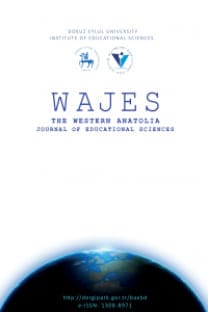Fen ve Teknoloji Öğretmenlerine Yönelik Teknoloji Destekli Zihin Haritaları Uygulamaları
Fen ve teknoloji öğretiminde, öğrencilerin derslerde aktif olmalarını sağlayacak teknoloji destekli etkinliklerle bilgilerini yapılandırmaları önem taşımaktadır. Zihin haritalama tekniği, öğrencilerin bilgiler arasında bağlantılar ve ilişkiler kurmalarını sağlayan, anlamlı öğrenmelerine katkıda bulunan görsel bir tekniktir. Öğrencinin herhangi bir konuya ilişkin hazırladığı zihin haritasını inceleyen bir öğretmen, onun zihinsel yapılandırmasına ilişkin fikir sahibi olabilmekte, gerekli görürse ek etkinlikler düzenleyebilmektedir. Öğrencilerin, Fen ve Teknoloji derslerinde, konulara ilişkin zihin haritaları hazırlayabilmeleri için, öncelikle onları eğitecek olan öğretmenlerin, zihin haritalama tekniğinin Fen ve Teknoloji derslerinde nasıl kullanıldığını öğrenmeleri gerekmektedir. Bu kapsamda, ülkemizin her bölgesinden, en çok Fen ve Teknoloji öğretmenine sahip birer ilinde, yani toplam 7 ilde Fen ve Teknoloji öğretmenlerine, “Fen ve Teknoloji Öğretiminde Zihin Haritalama Tekniği”, “Zihin Haritalarının Uygulanmasına Yönelik Çalışmalar”, “Mind Manager Programı ve Kullanımı”, “Mind Manager Uygulamaları” konularında hizmet içi eğitim seminerleri verilmiştir. Hizmet içi eğitim seminerleri, Milli Eğitim Bakanlığı’ndan gerekli izinler alındıktan sonra İzmir, Erzurum, Ankara, Diyarbakır, Samsun, Antalya ve Bursa illerinde yapılmıştır. Bu konulara ilişkin eğitim süresi, 1,5 iş günü, toplam 8 saattir. Bu çalışmada, Fen ve Teknoloji öğretmenlerinin, yapılan uygulamalar sırasında hazırlamış oldukları zihin haritası örneklerine yer verilmiştir.
Anahtar Kelimeler:
Fen ve teknoloji, zihin haritaları, Fen öğretmeni
Technologically Supported Mind Map Applications for Science and Technology Teachers
In science teaching, it is significant that students construct their knowledge with technologically supported activities and become active in lessons. Mind mapping is a visual technique, which contributes to meaningful learning and enables students to correlate and link their knowledge. A teacher that analyzes his/her students’ mind maps can have an idea of their mental construction and offer additional activities if needed. It is essential that science and technology teachers learn how to use and apply mind mapping techniques in Science and Technology course so that the students could prepare mind maps well. Within this scope, in-service training seminars were held in 7 cities of Turkey, one city from each region where the science and technology course teachers are the highest in number. The subjects of the seminars were; “Mind Mapping Technique in Science and Technology Teaching”, “Activities on Mind Map Applications”, “The Mind Manager Program and Using It” and “Applications of The Mind Manager Program”. The seminars were held in İzmir, Erzurum, Ankara, Diyarbakır, Samsun, Antalya and Bursa. Total duration of a seminar equals to 1,5 workday or 8 hours. This study includes examples of mind maps which science and technology teachers prepared during the seminars.
Keywords:
Science and technology, mind maps, science teacher,
___
- Amma, C. (2005). Effectiviness of Computer Based Mind Maps in the Learning of Biology at the Higher Secondary Level. New Delhi: ICDE International Conference (19-23 November 2005).
- Anonim, (2005). Fen ve Teknoloji Öğretim Programı. Ankara: Milli Eğitim Bakanlığı, Talim Terbiye Kurulu Başkanlığı.
- Aslan, A. (2006). İlköğretim Okulu 4. Sınıf Öğrencilerinin Bilgilendirici Metinleri Anlama, Özetleme ve Hatırlama Becerileri Üzerinde Zihin Haritalarının Etkisi. Yayınlanmamış Yüksek Lisans Tezi. Ankara, Gazi Üniversitesi Eğitim Bilimleri Enstitüsü.
- Brooks, J. G. & Brooks, M. G. (1993). In Search for Understanding the Case for Constructivist Classrooms. Alexandria, Virginia: ASCD.
- Buzan, T. & Buzan, B. (1995). The Mind Map Book: Radiant Thinking The Major Evolution in Human Through. London: BBC Worldwide Publishing.
- Ehrlich, A. R. (2001). Mind Mapping An Overview Bibliography.
- http://studenttabletpc.blogs.com/the_student_tablet_pc/files/mind_mapping_overview.pdf.
- (Erişim tarihi: 13 Mart 2006).
- Ersoy, A. (2005). İlköğretim Bilgisayar Dersindeki Sınıf Yerleşim Düzeni ve Öğretmen Rolünün Yapılandırmacı Öğrenmeye Göre Değerlendirilmesi. Turkısh Online Journal of Educational Technology. 20 (4).
- Holland, B., Holland, L. & Davies. J. (2004). An Investigation Into The Concept of Mind Mapping and The Use of Mind Mapping Software to Support and Improve Student Academic Performance. (Ed. H.Gale) Learning and Teaching Projects 2003/2004. University of Wolverhampton.
- Horstman, B. & White, W. (2002). Best Practice Teaching in College Success Courses: Integrating Best Practice Teaching Methods into College Succes Courses. The Journal of Teaching and Learning. 6(1).
- Ladge, D. (2002). How We Write? London, England: Routledge.
- Margulies, N. (1991). Mapping İnner Space: Learning and Teaching Mind Mapping. Zephyr. Tucson.
- Practor, T. (2002). Creative Problem Solving for Managers. London: Taylor and Francis Group E- Library.
- Rostron, S. S. (2002). Accelerating Performance: Powerful New Techniques for Developing People. USA, Milford: Kogan Page.
- Saban, A. (2000). Öğrenme Öğretme Süreci. Ankara: Nobel Yayın Dağıtım.
- Sevinç, E. (2005). Free Mind: Özgür Yazılım Dünyasından Zihin Özgürleştirme Hareketi. İstanbul: Bilgi Üniversitesi. eMBA Yazılım Geliştirme.
- Smith, R. L. (1999). The Knowledge Mapping Application: Ford’s Robust Engineering Process. Journa of Innovative Management, 5.
- Streibel, J. B. (2003). The Manager’s Guide to Effective Meetings. Blacklick, USA: McGraw-Hill Professional.
- Trevino, C. (2005). Mind Mapping and Outlining: Comparing Two Types of Graphic Organizers For Learning Seventh-Grade Life Science. Texas Tech University: Doctor of Philosophy.
- Weideman, M. & Kritzinger, W. (2003). Concept Mapping-A Proposed Theoretical Model for Implementation as a Knowledge Repository. New York: ICT in Higher Education.
- Yayın Aralığı: Yılda 2 Sayı
- Başlangıç: 2010
- Yayıncı: Dokuz Eylül Üniversitesi
Sayıdaki Diğer Makaleler
Fen ve Teknoloji Öğretmenlerinin İş Tatmin Düzeylerinin Bazı Değişkenlere Göre İncelenmesi
Zafer ADIGÜZEL, Mustafa KARADAĞ, Yasin ÜNSAL
Fen ve Teknoloji Öğretmenlerine Yönelik Teknoloji Destekli Zihin Haritaları Uygulamaları
Ali Günay BALIM, Güliz AYDIN, Suat TÜRKOĞUZ, Ertuğ EVREKLİ, Didem İNEL
Coğrafya Öğretiminde Aktif Öğrenmenin Akademik Başarı ve Tutum Üzerine Etkisi
